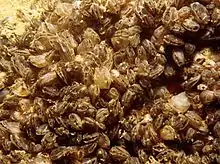Mytilopsis sallei
Mytilopsis sallei, the black-striped mussel, is a small marine bivalve mollusc in the family Dreissenidae, the false mussels.
| Mytilopsis sallei | |
|---|---|
 | |
| Scientific classification | |
| Kingdom: | Animalia |
| Phylum: | Mollusca |
| Class: | Bivalvia |
| Subclass: | Heterodonta |
| Order: | Myida |
| Family: | Dreissenidae |
| Genus: | Mytilopsis |
| Species: | M. sallei |
| Binomial name | |
| Mytilopsis sallei (Recluz, 1849) | |
It is closely related and ecologically similar to the zebra mussel, Dreissena polymorpha.
Distribution
The native range for this species is Central and South America. But like its relative the zebra mussel, the black-striped mussel is a significant pest in many countries outside its original range.
Habitat and distribution
Mytilopsis is typically found in brackish water, unlike Dreissena, which inhabits only fresh water. As adults. Mytilopsis can tolerate wide fluctuations in salinity.
This species is native to South America, the Panama Canal region (Hertlein and Hanna, 1949). The species was spread to many places around the world via ballast water. Southern Asia, Australia and some parts of Europe are the most negatively affected by Mytilopsis sallei which is a biodeteriorating agent and prevalent biofouler. This is an alien species to Asia and Australia; it flourishes there because there are no natural controlling organisms and also because this species is highly adaptable to its environment.
The first occurrence on the Indian subcontinent was in 1960 at Visakhapatnam Harbor, first recorded (Ganapathi, Lakshmana rao & Vargheese, 1971). It was later (Kalyana Sundaram, 1975) observed In Taiwan (CSIRO (CRIMP), Marine Pest Information sheet 1977), in Japan (CSIRO (CRIMP), Marine Pest Information sheet 1974). It was first identified in Kainada in 1984 (Balaji, 1984). In Japan it was first identified in 1980 (Habe, 1980, Otoni 2002 & Kimura and Hori, 2004). In Australia it was first observed at Darwin (Willan et al., 2000), in Thailand first found in 2001, (Swenn et al., 2001), in Singapore 2006 ( K.S.Tan and Morton, 2006, Global Invasive species Database). It was observed in Israel in 2009 ( B.S. Gali and Cesare Bogi, 2009).
However, some researchers argue that the earliest studies on Mytilopsis in India were wrongly reported as Mytilopsis sallei, and that subsequent studies used the same name for specimens collected from Japan, Hong Kong and Australia. They suggest that Mytilopsis allynea [type locality Fiji) and Mytilopsis adamsi (type locality San Jose Island, Panama) are conspecific, and that the same species of Mytilopsis is found in India, Hong Kong, Japan and other localities in Asia.[1]
Nomenclature
Significant doubt exists regarding the specific name sallei for this mussel. It is more likely to be Mytilopsis adamsi Morrison, 1946 as reported by Marelli & Gray, 1985.
References
- Jayachandran; et al. (2018). "Invasion of biofouling mussel Mytilopsis Conrad, 1857 (Bivalvia:Dreissenacea) in the Cochin backwaters, southwest coast of India" (PDF). Current Science. 115: 1198–1200.